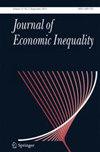Collective negative shocks and preferences for redistribution: Evidence from the COVID-19 crisis in Germany.
IF 2.4
3区 经济学
Q1 ECONOMICS
引用次数: 0
Abstract
Using new data from a three-wave panel survey administered in Germany between May 2020 and May 2021, this paper studies the impact of a negative shock affecting all strata of the population, such as the development of COVID-19, on preferences for redistribution. Exploiting the plausibly exogenous change in the severity of the infection rate at the county level, we show that, contrary to some theoretical expectations, the worse the crisis, the less our respondents expressed support for redistribution. We provide further evidence that this is not driven by a decrease in inequality aversion but might be driven by the individuals' level of trust.
集体负面冲击和再分配偏好:来自德国新冠肺炎危机的证据。
本文利用2020年5月至2021年5月在德国进行的三波小组调查的新数据,研究了影响所有阶层人口的负面冲击(如新冠肺炎的发展)对再分配偏好的影响。利用县一级感染率严重程度的看似外生的变化,我们发现,与一些理论预期相反,危机越严重,我们的受访者对再分配的支持就越少。我们提供了进一步的证据,证明这不是由厌恶不平等情绪的减少驱动的,而是可能由个人的信任水平驱动的。
本文章由计算机程序翻译,如有差异,请以英文原文为准。
求助全文
约1分钟内获得全文
求助全文
来源期刊

Journal of Economic Inequality
ECONOMICS-
CiteScore
3.60
自引率
8.30%
发文量
39
期刊介绍:
The Journal of Economic Inequality provides a forum for analysis of ''economic inequality'', broadly defined. Its scope includes: · Theoretical and empirical analysis· Monetary measures of ''well-being'' such as earnings, income, consumption, and wealth; non-monetary measures such as educational achievement and health and health care; multidimensional measures· Inequality and poverty within and between countries, and globally, and their trends over time· Inequalities of opportunity· Income mobility and poverty persistence· The factor distribution of income· Differences in ''well-being'' between socioeconomic groups, for example between men and women, generations, or ethnic groups· The effects of inequality on macroeconomic and other phenomena, and vice versa· Related statistical methods and data issues · Related policy analysis Papers need to prioritize the ''economic inequality'' dimension. For example, papers about trade and inequality, or inequality and growth, should not primarily be about trade or growth (in which case they should target a different journal). The same is true for papers considering the inter-relationships between the income distribution and the labour market, public policy, or demography.
Officially cited as: J Econ Inequal
 求助内容:
求助内容: 应助结果提醒方式:
应助结果提醒方式:


